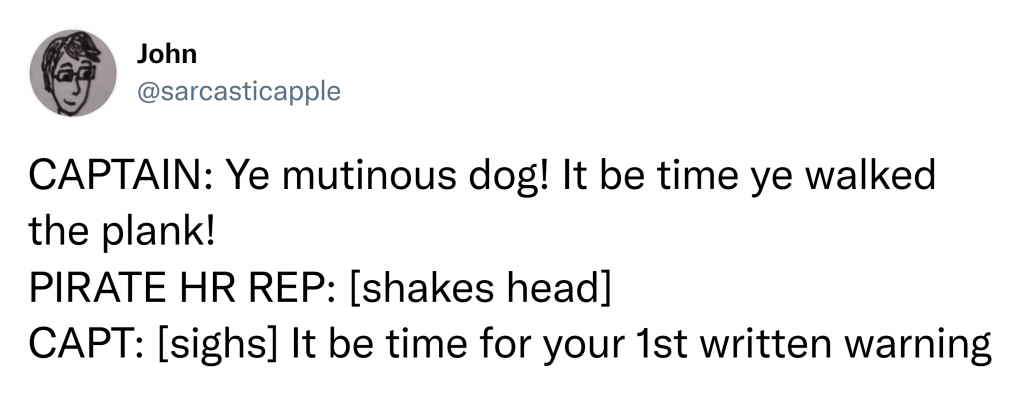Big Tech layoffs accelerated last week and now may reach Meta.


Big Tech layoffs accelerated last week and now may reach Meta.

It’s October 24th. The World Series starts Friday and wraps up as late as November 5 after owners locked players out during a late winter labor dispute last year.
Today’s Spotlight is 654 words — about 3 minutes to read.
Quoted:“What I consider offensive, you might be considering a joke. So it’s really important for us to not make a call for you. At the end of the day, you’re in the driver’s seat.“
— Instagram product designer Francesco Fugo to Vox. About half of people who get a message about bullying or harmful language they typed revise their comments.
Driving the news: Those Q3 tech earning calls this week will likely create a tsunami of poor economic news.
Three Important Stories
1) The FTC is looking into online behavior of funeral homes. The agency says that fewer than 40% provide pricing information online although they are required to do so in person.
2) Meta confirmed that it will sell Giphy after losing an appeal to a UK regulatory agency.
That’s important because: Meta reportedly fears similar orders in the U.S. that could affect Instagram or WhatsApp.
3) Google announced improvements to help people customize and stop specific categories from being advertised to them. Google also says that it has made it easier to completely disable ad personalization.


Amazon costs have led to a series of initiatives as the company slashes expenses to appease Wall Street: Fabric.com (purchased in 2018), Amazon Care (started in 2019), and dozens of underperforming stores have all been closed in recent weeks. Its logistics aren’t immune from cost-cutting. Amazon closed all but one U.S. call center last month, and dozens of warehouses were delayed, closed or canceled.
Engadget recently obtained internal documents showing $8 billion in employee attrition costs against $33 billion in net profit last year, an impossibly high number even for a firm with $60 billion cash on hand.
What’s next: Amazon reports Q3 earnings after the bell Thursday. Analysts are expecting earnings to be the best so far this year, but still low compared to previous years. We’re expecting to hear more about fulfillment center automation, retail store technology as cashiers are replaced, and its integration plans for One Medical and Roomba.
The story of a bear trapped in a North Carolina car is being repurposed by scammers. The story gets reactions when reposted with local but false information, but comments are disabled. Eventually, scammers replace the story with scam offers seemingly backed by locals.
Last week, we wrote about TikTok expansion. Now the company says it will allow creators to livestream adult-themed content beginning November 23, but what that really means is unclear. The TikTok site guidelines prohibit pornography, nudity, and explicit content.
Identify 8 different scenarios of legitimate and malicious emails. Discover the hidden traps and pitfalls Google engineers have set for you and pick up some great tips along the way.
Researchers at the University of Illinois have developed a predictive model that uses only six minutes of walking data to predict five year mortality probabilities. The model’s results are comparable to those using traditional risk factors, says one researcher.
Google Trends has created a specially themed version for Halloween showing top costumes nationally and locally based on search trends.


It’s October 17th. In many areas, voting has begun ahead of Election Day, 22 days away. Your local representative’s travels, votes, and fundraising are listed on ProPublica’s great new website.
Today’s Spotlight is 791 words — about 3 minutes to read.
Quoted:“It’s likely the material viewed by Molly… affected her mental health in a negative way and contributed to her death in a more than minimal way. It would not be safe to leave suicide as a conclusion — she died from an act of self harm while suffering from depression and the negative effects of online content.”
— British coroner Andrew Walker reversing a decision about a 14-year-old English girl’s suicide. Walker said that algorithms helped Molly find information about suicide and continually sent her content reinforcing her depression.
Driving the news: During Q3 earnings calls over the next ten days, tech companies will announce a litany of cost-cutting measures.
Three Important Stories
1) A Dutch court ruled that a Florida software company violated the human rights of a remote employee it fired after he refused to activate his video camera.
2) 87% of US teens own an iPhone, and 31% own an Apple Watch, reports Piper Sandler in its semi-annual survey of US teens.
Oops: A crash-detection algorithm in Apple devices is alerting emergency services when people are on fast roller coasters that experience sudden changes in altitude.
3) In its third week fighting ransomware, hospital chain CommonSpirit Health has postponed some care because of disruptions. The company operates 140 hospitals and 2,000 healthcare sites.


TikTok is not a social network. American users watch 80 minutes of videos on the site each day. The service does exceptionally well with younger Americans: only YouTube gets more visits from American teens.
“TikTok plays a different role in my life. It’s replacing television,” says global business head Blake Chandlee.
But it’s more than just TV. TikTok expansion is changing other categories:
Search and News: We told you last week that Google’s execs acknowledge losing ground in search to TikTok. Pew Research confirmed that 33% of TikTok teen visitors use the site for news.
Music: David Guetta, Coldplay, and BTS have all premiered music clips on the site. One artist told the BBC that she’ll post a snippet of a track that she’ll only finish if it is successful. There was news last week that TikTok parent ByteDance is in talks with music labels about going global with its music streaming service.
ECommerce: The company is hiring now to build fulfillment centers in the U.S., Axios scooped last week.
The bad news: U.S. regulators are under constant pressure to deal with a Chinese-owned company that has developed robust data profiles of tens of millions of Americans. The company says it “processes” its data here in the U.S., but nine employees dispute that, according to BuzzFeed.
Our take: Small or large organization, understanding TikTok culture now is key to working with or marketing to younger audiences.
On Instagram, an anti-vaccine post falsely claims that premature babies are more likely to develop complications from vaccinations. Details
DALL-E’s AI art function is coming to Microsoft’s Office suite in a new app called Microsoft Designer. Refresh yourself on how you can be a Dali from our Spotlight Explainer three weeks ago.
Google Maps can help you remember places you want to visit, whether on vacation, at restaurants, or for your bucket list. Lifehacker shows you how to make and store lists, share them with friends, or even publish them.
With an investment reportedly in the billions, expect to see more ads from Meta touting why you should look forward to working in virtual reality.
Stanford researchers have created an exoskeleton for legs that allows people with limited mobility to walk 9 percent faster with 17 percent less energy.
In Singapore, a robotic device can catch people who fall, so elderly people can exercise and those in physical therapy can benefit.
See videos from Stanford and Singapore.
Haikubox is a device that you install in your yard that identifies birds by the sounds they make. Like a doorbell camera, it saves the information for you to listen to later.

TikTok Expansion is issue #438 of Spotlight. Get it free in your email each Monday.